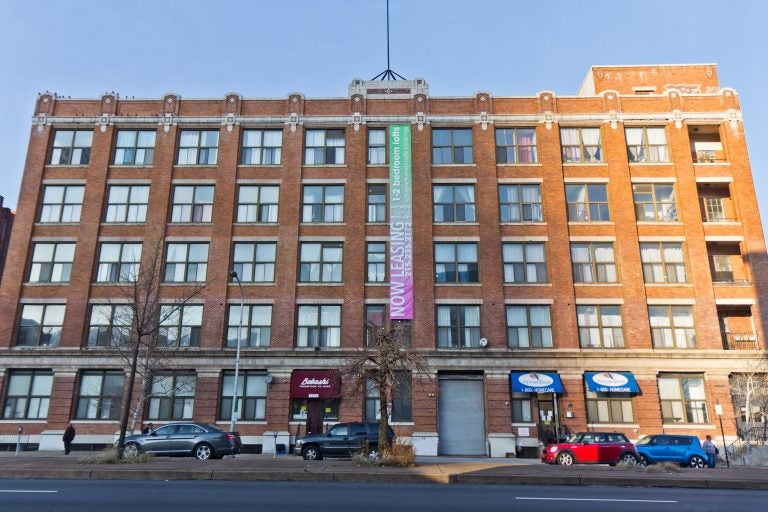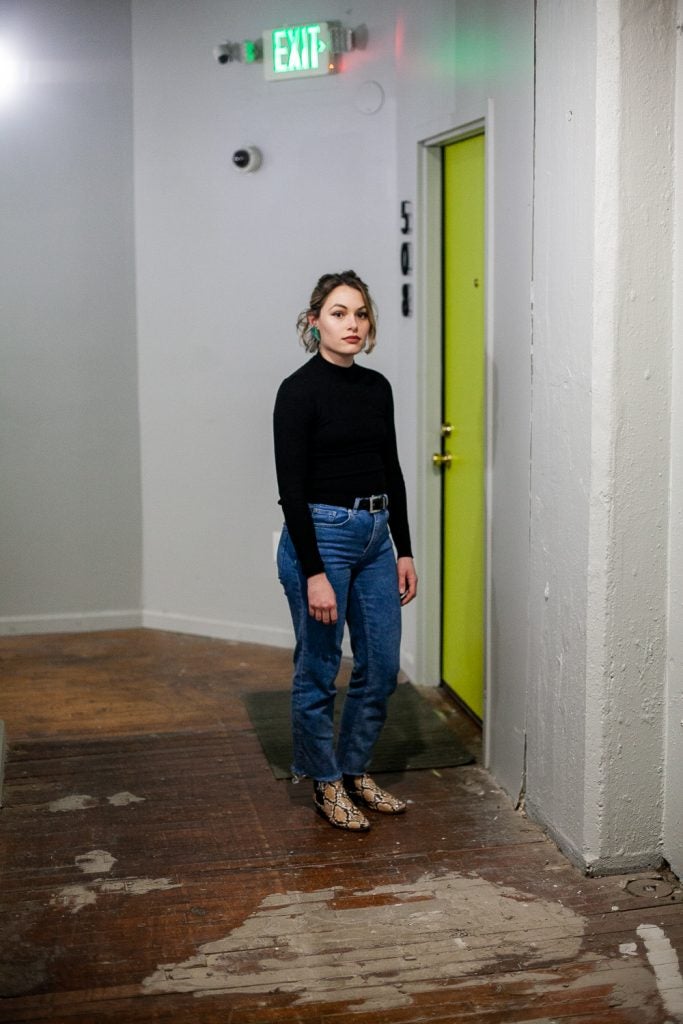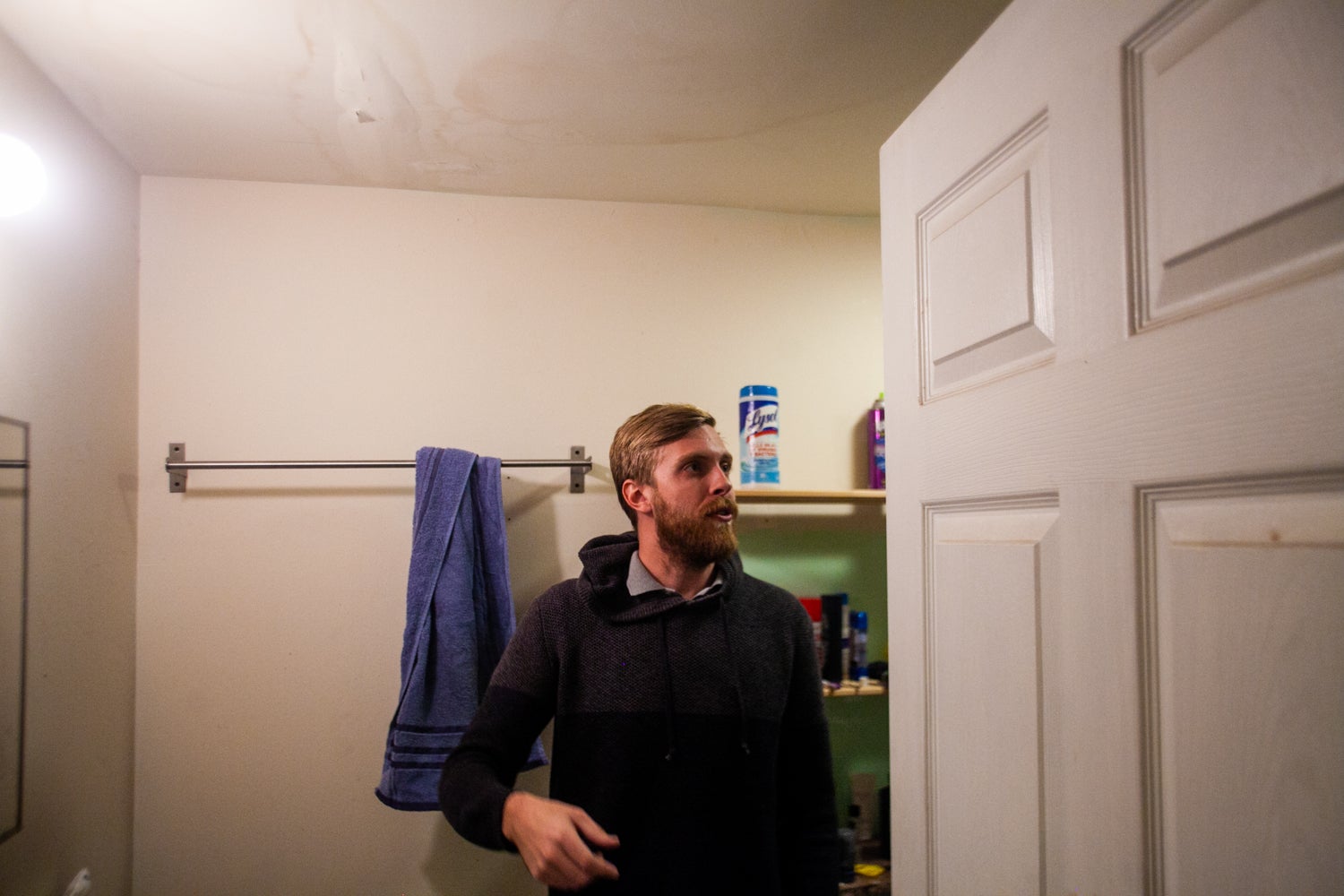‘Spring Arts’ remake dogged by tenant complaints, code violations
Tenants are complaining of mistreatment at the hands of the biggest landowner in a burgeoning warehouse district northeast of Center City Philadelphia.

Arts & Crafts Holding advertises 1217 Spring Garden Street as "artistic spaces, crafted with love." (Kimberly Paynter/WHYY)
This story originally appeared on PlanPhilly.
—
When Arts & Crafts Holdings bought the property at 1217 Spring Garden St. for $15.7 million in April, the Philadelphia development company pitched tenants in the aging loft building on a new, utopic vision for their rental community.
Their new deep-pocketed landlord had poured some $320 million into transforming the entire warehouse district northeast of City Hall into a cultural destination called “Spring Arts District.”
Long-delayed renovations of the 74-unit former machine shop and the 20-plus other nearby buildings the company had bought were coming, they told tenants. A promotional page for the remade 1217 Spring Garden advertised “artistic spaces, crafted with love.”
But seven months later, residents say they aren’t feeling the love. Instead, they have endured months of delayed maintenance, ranging from chronic leaks and mold issues to endlessly broken elevators.
“I went to the ER over concerns about issues with the black mold in my unit,” said John Bullick, a resident of the complex. “I told my neighbors to put money into escrow, don’t pay anything until you get it fixed.”
Others report intrusive construction crews, blocked fire exits, or threatening letters outlining steep rent increases or sudden lease termination. Some residents have already left. Some who remain have formed an ad-hoc tenants unions or sought legal counsel in the face of changes to their leases or living conditions.
City records indicate there is credence to their complaints. After being contacted by a reporter about tenants’ problems, the Department of Licenses & Inspections sent inspectors to the property and issued a string of fire code, construction and property maintenance violations.
“The violations were for conditions in an apartment (water penetration in bathroom, broken vent in bathroom, insufficient heat in a bedroom, and no working smoke detector), for working on exterior walls and installing windows without a permit, and for failure to submit a report from an engineer attesting to the condition of the building façade,” Karen Guss, a spokeswoman for L&I, wrote in an email.
L&I records show the building racked up similar fire code and property maintenance violations in September. Licensing records indicate that Arts & Crafts was also collecting rents without a valid rental license for seven months, a violation of city housing codes.
Arts & Crafts partner Aaron Cohen declined to discuss past L&I violations. He said current issues at the building were completely unintentional, the product of a property manager who was failing to pass along tenants complaints.
“Any current tenant of ours, we addressed their concerns immediately,” said Cohen, a veteran of Brandywine Realty Trust who worked on the $1 billion Cira Centre South project that ignited University City’s building boom.
“We do have a fair number of properties in the area and a fair number of tenants and our intention … is to improve the quality of life in the neighborhood,” Cohen said.

A ‘gentler’ takeover
Arts and Crafts is led by Cohen and his partner, Craig Grossman, who helped turn a once dingy three-block stretch of 13th Street between Chestnut and Locust streets into a stylish destination for tapas, luxury lofts and commercial space branded with an arty touch. The 3-year-old LLC owns 1.6 million square feet of real estate in an area largely bound by Spring Garden and Callowhill, Ridge Avenue and Ninth Street. Their empire includes destinations such as the Electric Factory and Union Transfer as well as other large properties in the 19123 ZIP code, where property values have doubled over the last decade.
Disgruntled former tenants relate a classic tale of second-wave gentrification, as middle-income artists, restaurant workers, and students – attracted to bars, music venues, and cheap rents – end up leaving the area to be replaced by wealthier tenants drawn to these same amenities and able to pay more.
It’s a story very familiar to anyone who lived through Bart Blatstein’s reinvention of Northern Liberties, the developer-driven remake of DUMBO in Brooklyn or even the poshification of the West Side of Manhattan, where the High Line runs. Not coincidentally, Arts & Crafts bought up many properties that look out to the elevated railroad line recently resurrected as the Rail Park.
But Arts & Crafts said its strategy would maintain the elements that made the area a magnet for young people and creative types.
“We seek to reimagine historic buildings and the urban spaces between them creating a vibrant canvas for the new economy’s entrepreneurs & makers. A neighborhood is more than the sum of its parts,” reads a description of the company on its website.
The company has made a point of working with arts community stalwarts like Mural Arts Philadelphia and small businesses.
“Our process is gentler. A lot of developers like to have a takeover,” Cohen told a Philadelphia Magazine reporter in 2017. “We’re coming into a place where there’s not much activity and bringing the excitement of entrepreneurs.”
But gentle is not how former 1217 Spring Garden resident Paige Van De Winkle describes her experience with Arts & Crafts. Van De Winkle, a flight attendant and writer, moved out in early December after months of leaks and unscheduled construction work in her unit. The company professes to value artists and other cultural workers, but “it just feels false and disingenuous,” she said.
Several remaining residents, who asked to remain anonymous for fear of reprisal, sent photographs of units showing severe leaks, mold or broken appliances. Some described broken air-conditioning condensers in the summer months and, more recently, broken heating.

At least five units on the Ridge Avenue side of the building recently had their only windows completely boarded over by construction crews. At least one of the boarded units was still occupied.
Tenants also produced certified letters and emails from Arts & Crafts requiring residents to sign non-negotiable lease addenda. One current tenant showed a notice asserting that his yearlong lease had expired just seven months after he’d signed it.
After a reporter called with questions about lease terminations, the company dispatched a letter to all tenants stating that it would be “reviewing certain leases that we may not have chosen to terminate.”
Some were invited to remain in renovated units with a 50 percent markup in rents – a “discounted rate” according to the notices. But existing tenants said the new units were much like the old, with a coat of paint, new countertops and a few other appointments.
Renter, beware
The tenants at 1217 Spring Garden are far from alone in their experience. Over the last decade, Philadelphia has experienced a rise in rentership well above the national average with nearly half of all households now paying a landlord. Meanwhile, as neighborhoods gentrify, complaints of lease changes and tenant harassment are on the rise, and mass evictions are becoming more common, as Rasheeda Phillips, managing attorney at Community Legal Services of Philadelphia and Philip Lorde, executive director of the Tenant Union Representative Network, wrote in a recent op-ed.
City officials have taken steps intended to mitigate what housing advocates consider a brewing crisis. About a year ago, Philadelphia launched a program designed to educate renters about their rights and help them advocate for themselves in tenant-landlord court. Earlier this month, City Council passed “good cause” legislation protecting renters with month-to-month leases.
Most of the tenants interviewed for this article are moving to farther outlying neighborhoods that are also gentrifying – parts of South Philly, Brewerytown and Francisville. Bullick said this breakup is the biggest loss for a building where many tenants had former long-lasting friendships, and it was not uncommon for neighbors to drift between units on weekend nights to say hello or share drinks.
“It was a community, and now it’s no longer. The most disappointing part is that we all enjoyed each other,“ he said. “I’m a big free-market guy myself, but you can’t do business this way.”
WHYY is your source for fact-based, in-depth journalism and information. As a nonprofit organization, we rely on financial support from readers like you. Please give today.







